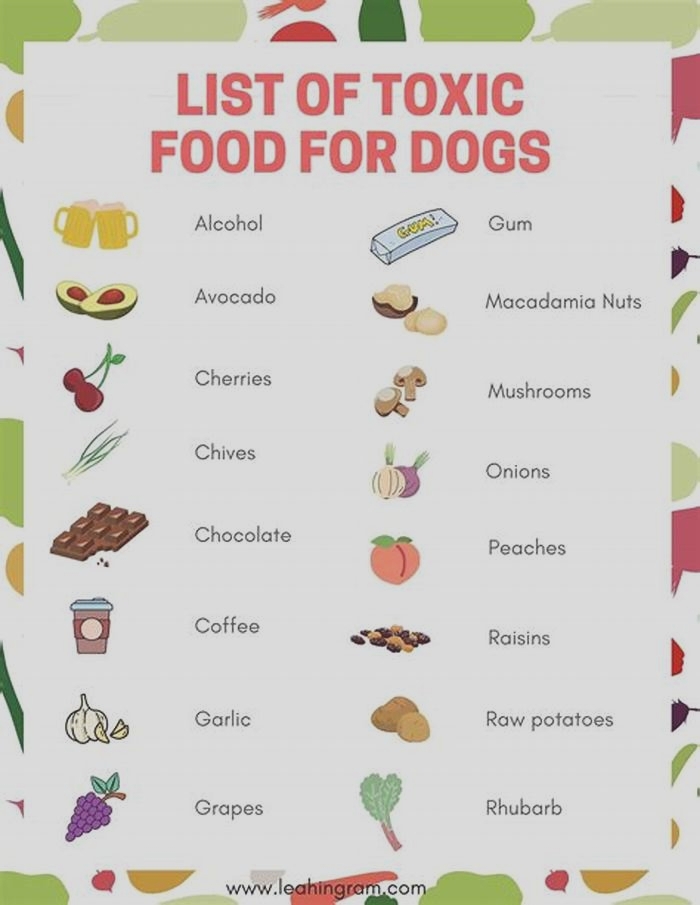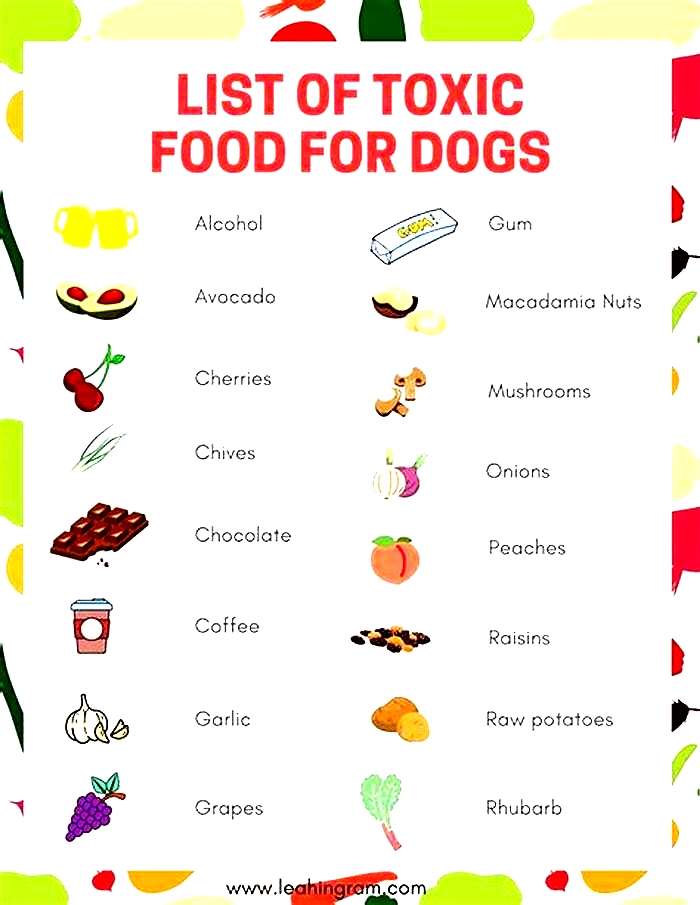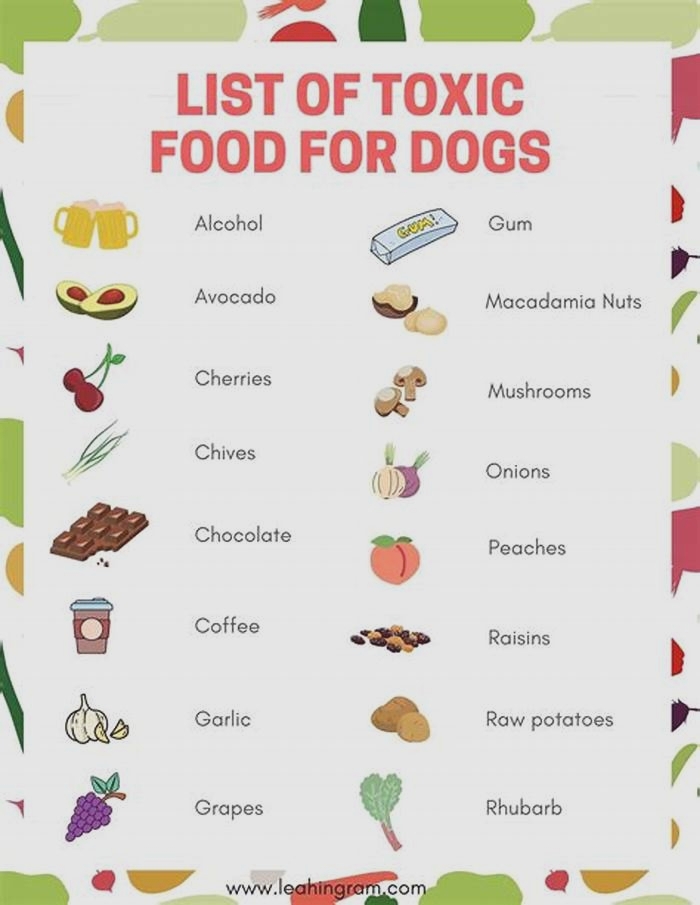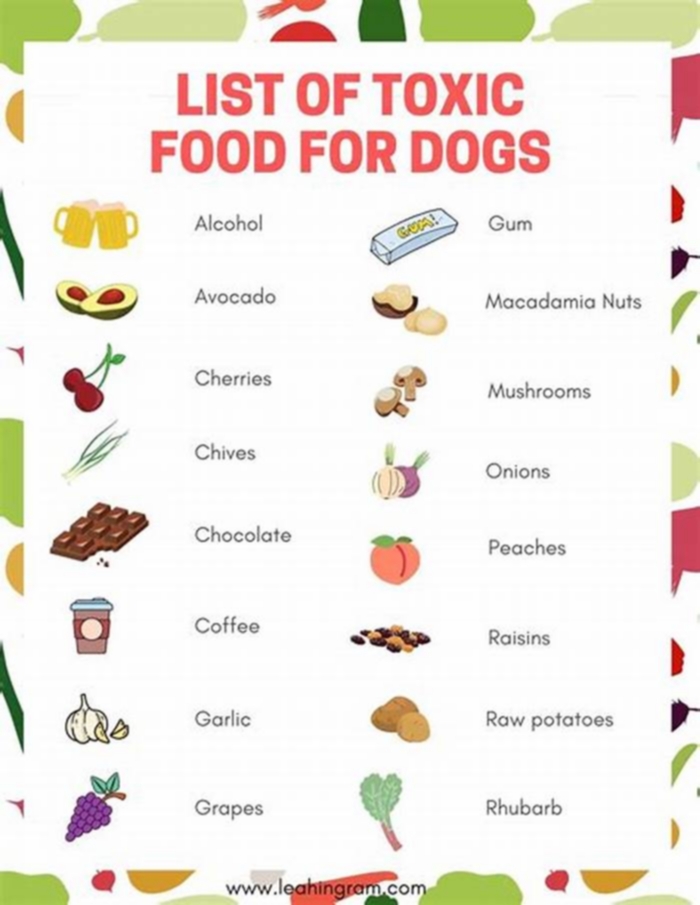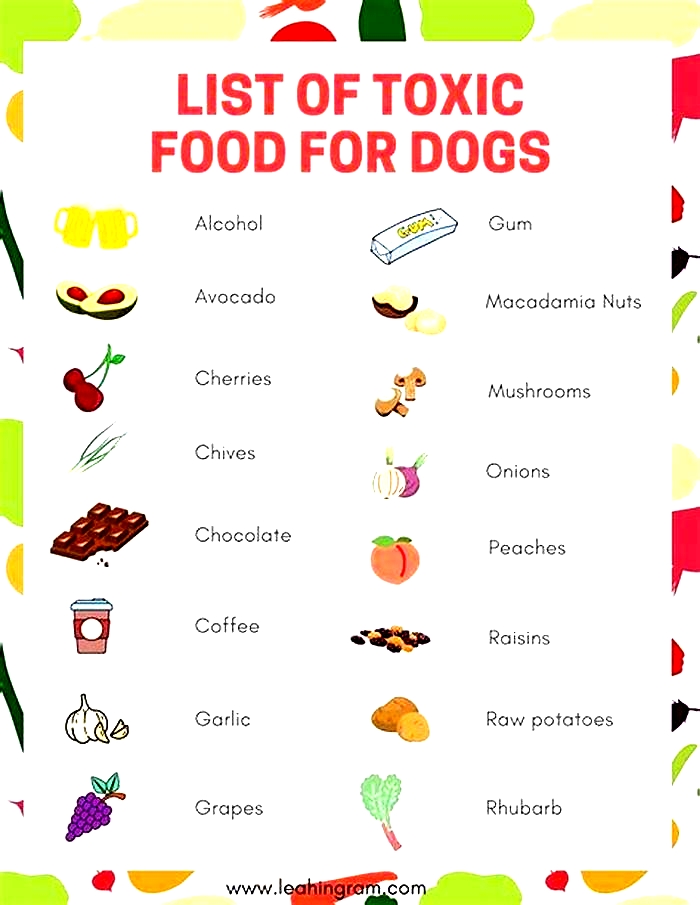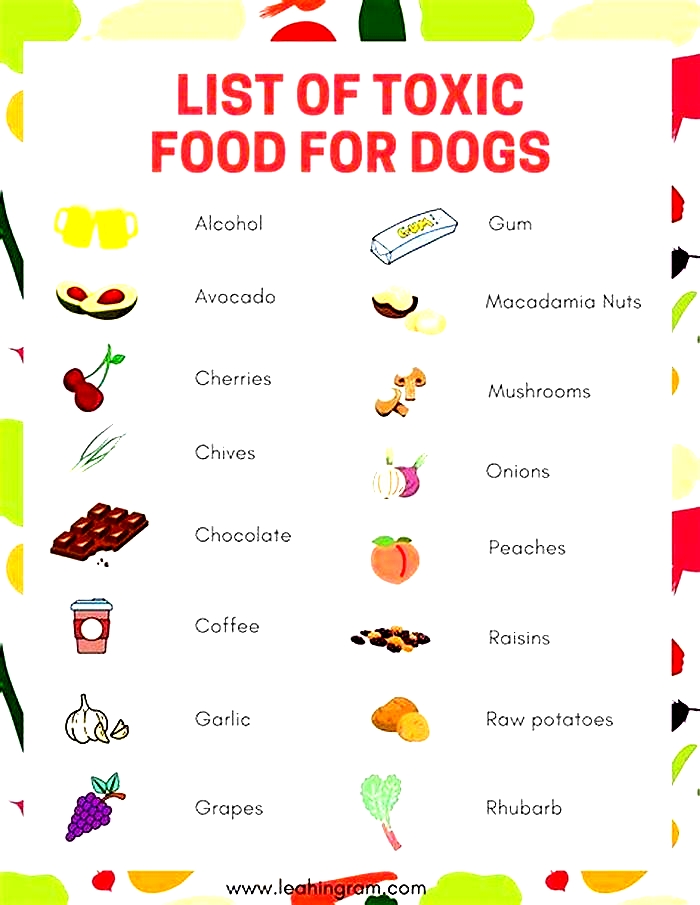what 6 foods are toxic to dogs
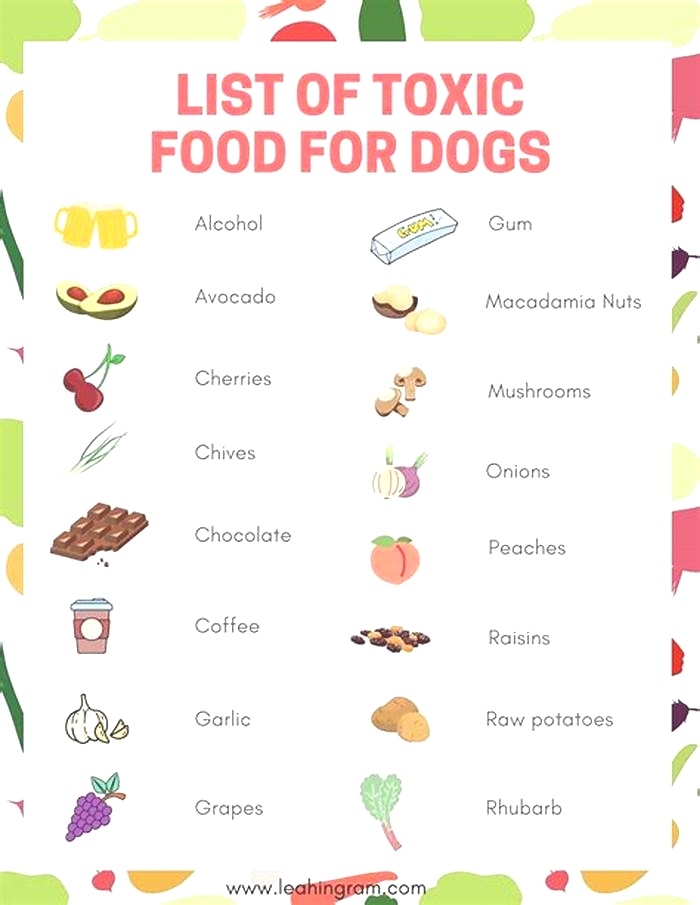
Which foods are toxic and poisonous to dogs?
Onions, garlic, leek, and chives are commonly used as ingredients in many dishes due to their strong aromatic properties. In dogs, these ingredients can cause anaemia from red blood cell destruction and dogs are highly susceptible to poisoning from human food containing them, even when the food is cooked thoroughly. Common signs of poisoning from these ingredients include vomiting, diarrhoea, abdominal pain, loss of appetite, and depression, but dont wait to see! If you think your dog has eaten anything containing these, call their vet ASAP.
Ethanol is an alcohol found in a variety of products, such as alcoholic beverages, medication, perfume, mouthwash, some thermometers, and certain forms of antifreeze. It is also used as a disinfectant and in many hand sanitisers. Usually, ethanol poisoning in dogs comes about as a result of accidental ingestion of alcoholic beverages but can also be due to eating uncooked bread and pizza dough, which contain yeast that metabolizes carbohydrates to ethanol and carbon dioxide. Toxicity causes central nervous system depression, and clinical signs range from lethargy/depression and incoordination to tremors and death.
Grapes and their dried products (raisins, sultanas, and currants) can cause kidney failure in dogs. The fruits may be ingested raw or cooked as ingredients of fruit cake, mince pies, malt loaf, snack bars, scones, and other baked goods. Ingestion of any quantity of these fruits is potentially dangerous, and can result in vomiting, loss of appetite, lethargy, abdominal pain and even death is kidney failure is severe.
Chocolate contains a substance called theobromine, which dogs and some other animals struggle to metabolise. Most poisoning cases occur because of chocolate ingestion. Chocolate poisoning episodes are more common around the holidays, particularly Easter or Christmas time when there is a higher occurrence of chocolate products in the home, and most likely, in your office too.Small amounts of theobromine can cause vomiting and diarrhoea, but higher doses can cause seizures and occasionally death. A vet should be able to advise on how serious the situation is based on the size of the dog and the quantity ingested.
Xylitol (also known as E967) is a naturally occurring sweetener that is used in many food products instead of sugar, including sugar-free gum, mints, sweets, and some baked goods and peanut butter. It is also sometimes used in dental products, such as mouthwash and toothpaste. Xylitol can stimulate insulin release in dogs, leading to a dramatic crash in blood sugar levels. It can also cause liver failure in dogs and could be as fast acting as under an hour before signs appear, or it could be up to 12 hours before any signs appear. Therefore, if you suspect your dog has consumed anything with Xylitol, contact their vet immediately.
Avocados have become very popular in recent years, but these fruits contain persin, a fungicidal toxin. It could cause serious health issues if a dog eats too much, so steer clear of any at all. Persin is mostly located in the leaves and bark of the avocado plant and in the pits and skin of the fruit, but it is also found in the flesh of the avocado in a less concentrated amount. Unripened fruits also contain higher amounts of persin. Its best to err on the side of caution and treat all parts of avocado as potentially be hazardous to dogs.
Tea and coffee (and hot chocolate) feature organic compounds that can be harmful to dogs, including caffeine, theobromine, and theophylline. These are also commonly found in a variety of foods, beverages, human medication, and other products in the home. Caffeine is found in coffee, tea, guarana, and as an additive in many soft drinks. Theobromine is found in cacao seeds and in products manufactured from these seeds, such as chocolate. Theophylline is found in tea along with caffeine. Caffeine is also used in human medication to increase mental alertness, and theophylline is widely used in anti-asthma drugs. All of these are harmful if ingested by dogs so should be kept away (and dogs certainly shouldnt be allowed a sip of tea/coffee with their own breakfast.)
Macadamia nuts are produced by trees of the genusMacadamia and are very popular as snacks for human consumption, both as plain nuts or when used in cakes, cookies, or in nutty chocolate bars. Even ingesting a tiny amount of macadamia nut can be very harmful for dogs. If your dog eats macadamia nuts, they could become very ill, including showing muscle weakness (particularly hind limb weakness), depression, vomiting, co-ordination problems, tremors, hyperthermia, abdominal pain, lameness, and stiffness. Call a vet if you think they have eaten some so that action can be taken before signs occur.
Human Foods That Are Dangerous for Your Dog
 While we consider dogs to be members of our family, feeding them the same food we eat can cause injury to them. Dogs are not used to eating the oily, fatty foods that we do, and they can get diarrhea and upset stomachs from them. Its important to know what foods are toxic to dogs and avoid them.
While we consider dogs to be members of our family, feeding them the same food we eat can cause injury to them. Dogs are not used to eating the oily, fatty foods that we do, and they can get diarrhea and upset stomachs from them. Its important to know what foods are toxic to dogs and avoid them.
Chocolate and Caffeine
Its a pretty well-known fact that chocolate is harmful to dogs. Unlike their feline friends, most dogs dont have an off button when it comes to finding food. The amount and type of chocolate your dog consumes determines the symptoms and toxicity level he will experience. Symptoms can include vomiting, diarrhea, increased thirst, abdominal discomfort, lethargy, muscle tremors, irregular heartbeat, high body temperature, seizures and death. The darker the chocolate is (for instance, bakers chocolate or cocoa powder), the more dangerous it is to your puppy. They contain a higher concentration of caffeine and theobromine, both of which cause toxicosis in dogs. Keep your dog away from caffeinated beverages as well. Learn more about the dangers of your dog consuming chocolate here.
Grapes and Raisins
While grapes and raisins are not harmful to some dogs, they have been associated with kidney failure in others. Simply put, its not worth the risk to find out! Vomiting, lethargy and diarrhea can occur within 12 hours of ingestion. If the symptoms are not treated, they can lead to dehydration, decreased appetite and increased urination followed by decreased urination. If your dog has consumed grapes or raisins and these signs occur, take her to a vet immediately. Your dog can develop long-term kidney disease or even die from kidney failure within three to four days.
Alcohol and Raw Bread Dough
Small amounts of alcohol found in drinks, syrups and raw bread dough can be poisonous to dogs. These products contain ethanol, and beer also contains hops, both of which can cause alcohol intoxication. Signs of intoxication include vomiting, disorientation, high body temperature, restlessness, excessive panting, muscle tremors and seizures. Dogs who show signs of alcohol intoxication should be monitored by a vet until they recover, as it can cause failure of the organ systems and even death. The yeast in raw bread dough can also cause stomach expansion, which can result in tissue damage and difficulty breathing.
Xylitol
Xylitol is an artificial sweetener found in foods like sugarless gum, sugar-free candy and baked goods. It can also be found in toothpaste, mouthwash, chewable vitamins and cough drops. Ingestion can cause a life-threatening drop in your dogs blood sugar, as well as liver damage. Symptoms include vomiting, seizures and loss of coordination, which can occur anywhere from a few minutes to several hours after ingestion. According to the Pet Poison Helpline, a 10-pound dog would only need to eat a single piece of sugar-free gum to reach a potentially toxic dose. Dogs that ingest large amounts of xylitol can also develop liver failure. If you suspect that your dog has consumed anything that might contain Xylitol it is important that you contact your vet immediately.
Onions and Garlic
Anything in the onion familyfrom garlic to shallots to scallions to chivesis toxic to dogs. They contain compounds that can cause gastroenteritis, anemia and serious damage to the red blood cells. Garlic is considered to be five times as potent as onions. Signs of onion or garlic poisoning often do not appear for several days after ingestion, but include lethargy, weakness and orange- to dark red-tinged urine. Japanese breeds of dogs such as Akitas and Shiba Inus tend to be more sensitive to garlic and onions.
Other Foods Harmful to Dogs
Dairy products can upset your dogs digestive system and cause diarrhea as well as food allergies. Ingestion of just a few macadamia nuts can cause weakness, paralysis and lack of coordination. Avocados contain persin, which can cause mild stomach upset in dogs. The bones in meat, chicken and fish can also be very hazardous to your dog. They can splinter and stick in the throat, break teeth or cut the intestines.
If you are unsure if you can feed a food to your dog, always consult your veterinarian first. As a general rule of thumb it is best to avoid feeding your dog human food anyways. While it can be hard to ignore those puppy dog eyes looking at you at the dinner table, feeding your dog can often result in weight gain among other more serious issues. To keep your dog out of harms way, it is best to stick to a diet of food specifically formulated to meet your dogs nutritional needs.
Toxic Food For Dogs
The food we eat is delicious, but some of it can be toxic to our pets.
When your dog or cat enjoys occasional treats from the dinner table, a home-cooked diet, or even gets into food not meant for him or her, please keep in mind that these following foods are not safe. This is even more important during the festive season when family and friends can often think they are doing your dog a favour by feeding him a special treat.
Bread Dough
While cooked bread is generally safe for our pets, uncooked bread dough made with yeast can cause problems. The yeast in the bread dough can make ethanol gas when it ferments in a warm and moist environment, such as the stomach. This ethanol gas can lead to a distended stomach, possible twisting of the stomach (GDV, also known as bloat), or alcohol toxicosis. The effects of alcohol can include stumbling, weakness, blindness, vomiting and loss of consciousness. If your pet eats bread dough, please seek medical attention immediately.
Chocolate
Chocolate is delicious to people and animals alike. Unfortunately, dogs and cats are unable to clear the metabolic products as quickly as humans do, which leads to toxic effects. Chocolate (except for white chocolate) contains theobromine and caffeine. Both of these products can dangerously stimulate the bodys heart and nervous system, leading to irregular heart rhythm, high blood pressure, muscle tremors and possibly seizures. Because the various types of chocolate contain different amounts of theobromine, you should contact a veterinarian immediately to determine if your pet needs emergency treatment.
Macadamia Nuts
Macadamia nuts can affect the nervous system, joints and gastrointestinal tract in dogs. Symptoms may include painful joints, vomiting, weakness, unsteady gait, tremors and depression. Because even a small amount of nuts can cause symptoms, immediate treatment by a veterinarian is recommended.
Grapes and Raisins
Approximately half the number of dogs who eat grapes or raisins develop kidney failure. Unfortunately, the toxic agent in the grapes/raisins has not been identified, and it is unknown why some dogs are affected by the fruit while others are not. Even one grape or raisin has the possibility of affecting the kidneys, so immediate medical attention is recommended for all dogs that may have eaten any. There are limited reports of kidney failure in cats after eating grape/ raisins, but it is uncertain if this is due to decreased toxicity or decreased likelihood of eating the fruit. Because kidney failure can be fatal, hospitalisation for several days and fluid therapy to support the kidneys is usually recommended when grapes/raisins have been eaten.
Mouldy food
Mould on food can produce toxins which affects the nervous system in dogs and cats. Foods most often associated with these toxins include mouldy dairy products, walnuts, peanuts, or grain products including pasta and bread. Access to a compost bin or decaying plant material is also associated with these toxins. Symptoms can be severe and range from mild muscle tremors to hypersalivation, agitation, seizures, overheating and even death. Most patients with this toxicity require hospitalisation and aggressive treatment. Any pet known or suspected to have eaten mouldy food should be brought to a veterinarian for mergency treatment.
Onions and Garlic
Raw or cooked onion and garlic contain compounds which damage red blood cells, leading to anaemia. Cats are more susceptible than dogs. Symptoms may not be visible for several days following ingestion, and can include weakness, lethargy, pale gums, vomiting, diarrhoea, and increased breathing rate or effort. If the anaemia is significant, a blood transfusion may be necessary. Any pet found to have eaten onions or garlic should be brought to a veterinarian for emergency treatment.
Salt
The most common causes of excessive salt ingestion include homemade play dough, paintballs, de-icing salts and sea water. Symptoms associated with salt toxicity include vomiting, diarrhoea, muscle tremors, weakness, difficulty breathing, seizures and loss of consciousness. Patients with salt intoxication require immediate and aggressive medical care
Xylitol
Xylitol is a sugar substitute used in many foods including gum, hard candies, baked goods and toothpaste. Dogs are highly sensitive to this product, and it can rapidly drop blood sugar levels and affect the liver. Clinical signs can include vomiting, weakness, tremors, seizures, collapse, bleeding and jaundice. Effects on blood sugar occur rapidly while liver changes may take 1-3 days to develop. Hospitalisation with close monitoring and aggressive care is recommended for dogs with who have ingested xylitol.
Mushrooms
These can be extremely injurious to pet health and even fatal to dogs. Some kinds are worse than others, so it is best to prevent your dog from coming into contact with mushrooms of any type. Ensure that dogs are not attracted to wild mushrooms either, as these are poisonous to everyone, including humans.
Avocado and Persimmons
Avocados cause fluid accumulation in the lungs and are very toxic to dogs. Every part of them, including fruit, pits, jacket and leaves, are dangerous. The same goes for persimmons.
Tomatoes, Potatoes and Rhubarb
Tomatoes, especially unripe green ones, are toxic and can cause all sorts of problems that can lead to heart failure. Potato jackets are especially bad for dogs, as is the entire rhubarb plant. In fact, some parts of rhubarb are toxic to humans, too.
Nutmeg
This appears in various foods, especially those eaten around the holidays. It can be lethal to dogs. Avoid feeding processed gingerbread cookies, eggnog and other nutmeg-laced products to your canine friend.
Alcohol
While it is something that may happen in movies and on television, dogs should never ingest liquor of any sort in real life. Alcohol causes various behavioural problems (similar to humans) and may cause seizures, cardiac arrest and death, depending on how much alcohol a dog has consumed.
Source: http://www.womansday.com/life/pet-care/a3775/pethealth-101-10-toxic-foods-for-dogs-77184/ Author: E.A. Anne
Written By Dr Mara Hickey DVM Head Emergency & Critical care Service The Sydney University Veterinary Teaching Hospital www.uvths.com.au
Mara has been in the field of emergency and critical care medicine since 1996, first working as a veterinary assistant, and later obtaining certification as a veterinary technician. She graduated as a veterinarian from the University of Wisconsin in 2008 and pursued additional training at a private practice emergency referral hospital as well as at the University of California at Davis. In 2014, she completed a residency in emergency and critical care at a private practice in Los Angeles. She moved to Australia in May 2015 to head the emergency and critical care service.

